[click on blue links for further information]
The brilliant author, David Wallace, gave a commencement speech at Kenyon College in 2005 with the title This is Water: Some Thoughts, Delivered on a Significant Occasion, about Living a Compassionate Life. You can hear the man himself deliver the speech on youtube, you can download a PDF version for FREE, or buy the speech from Amazon. It will help to understand what I’m about to say if you are familiar with Wallace’s speech.
Another brilliant man, the philosopher Marshall McLuhan, coined the now popular phrase “the medium is the message.” For some brief remarks and further links on McLuhan, I would recommend this adulatory post over at Brain Pickings: Tom Wolfe on Marshall McLuhan for His 100th Would-Be Birthday.
What is it about a neighborhood restaurant that encapsulates both Wallace’s speech and McLuhan’s famous sentence? That is what I propose to discuss. And yes, the medium is the message, as you will see.
I reviewed Delarosa in an earlier BLOG (Mezcal Brings Out Cow Hollow Eatery’s Oaxacan Roots). Why revisit? It’s a fair question. Partly it’s related to a habit my wife and I have of discussing the people around us when we find ourselves in public places, making up stories about them, imagining their lives in a David Wallace sort of way.
Wallace was spot on when he said your life changes when you realize you get to choose what to think about, that you are not tied to your “default setting” of me, me, me all the time. When you purposely change your “default setting”, the world around you changes. In Wallace’s words:
It will actually be within your power to experience a crowded, hot, slow, consumer-hell-type situation as not only meaningful, but sacred, on fire with the same force that lit the stars —compassion, love, the subsurface unity of all things.
If that isn’t enough, there’s more. I’m not going to try to explain Marshall McLuhan’s famous phrase “the medium is the message” in any detail. Suffice it to say that I’m using a restaurant as the “medium” and people as the message and that the McLuhan Equation applies because the restaurant atmosphere affects everything, not only the people in it, but also the people watching. I know this because I once owned a restaurant.
A neighborhood restaurant is like a small town where everyone knows everyone else, at least by sight, eventually. Conversations arise naturally. Some are closed off quickly. Some resume over and over again.

Antonio
I first saw Antonio, a busser at Delarosa, walking out the restaurant to deliver lunch to someone offsite. My wife told me: “I’ll bet that delivery is going to Nola. She’s not here today.” I asked Antonio when he returned. Turns out, my wife was right as usual. Nola is a lovely older woman. We noticed she arrives at Delarosa for lunch almost every day at around opening time. “She can be a little difficult,” said Antonio, “but I like her.” We liked her too. We often were the first two tables to arrive and we had a few conversations with Nola. We grew to like her. Unfortunately Nola had to leave the area for health reasons. We miss her, but she’s still here in our heads, part of the Delarosa family, part of the medium that is the message.
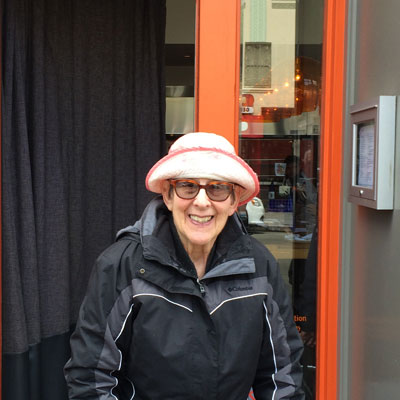
Nola
There are essentially four different subgroups, separate but equally important, that inhabit Delarosa at any given time: the cooks, the wait staff, bartenders, and host, the suppliers who come and go throughout the day, and of course the customers. All four groups interact as in a complicated ballet in ways shaped by the aura the restaurant projects unaware of the ballet of which they are a part. Marshall McLuhan described this in an interview published in Playboy Magazine:
… all media, from the phonetic alphabet to the computer, are extensions of man that cause deep and lasting changes in him and transform his environment. Such an extension is an intensification, an amplification of an organ, sense or function, and whenever it takes place, the central nervous system appears to institute a self-protective numbing of the affected area, insulating and anesthetizing it from conscious awareness of what’s happening to it. It’s a process rather like that which occurs to the body under shock or stress conditions, or to the mind in line with the Freudian concept of repression. I call this peculiar form of self-hypnosis Narcissus narcosis, a syndrome whereby man remains as unaware of the psychic and social effects of his new technology as a fish of the water it swims in. As a result, precisely at the point where a new media-induced environment becomes all pervasive and transmogrifies our sensory balance, it also becomes invisible.
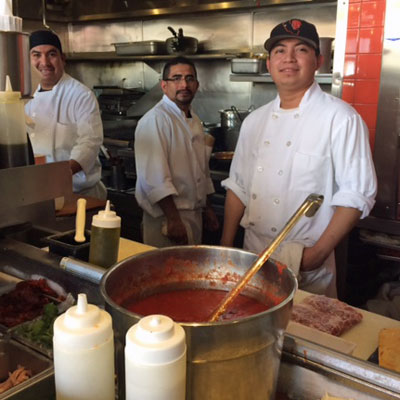
Cocina
The result when the Delarosa ballet is well-performed is that everyone who participates learns, as Wallace says, how to prevent yourself
… from going through your comfortable, prosperous, respectable adult life dead, unconscious, a slave to your head and to your natural default setting of being uniquely, completely, imperially alone, day in and day out.
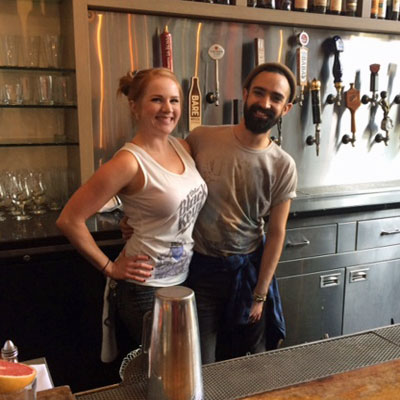
Bartenders
And that is why I’ve returned to Delarosa one more time and why I feel compelled to write about it again. Sometimes it’s as simple as one thing leads to another. Antonio is from Puebla. We naturally spoke of places in Mexico we both knew and that led to the subject of mezcal (A Personal Mezcal Tasting) and to raicilla (Muriel’s Raicilla) and to pulque and ultimately to a glass of Del Maguey Minero mezcal.
It takes years before a maguey plant is mature enough to be harvested for mezcal, raicilla, and pulque. The plant dies once the piña is uprooted to make the mezcal. Antonio explained that his family in Puebla made pulque. Pulque is fermented from the sap (aguamiel) of the maguey plant. The piña is not uprooted. The sap is drawn from the maguey and the piña is left intact. This can be done several times before the maguey finally dies, sometimes up to a year. Pulque is fermented. Its alcohol content is less than beer. It is a very old beverage and was used by the indigenous people before the Spaniards brought the process of distillation. Mezcal and raicilla are distilled beverages and strong like tequila. Tequila is a type of mezcal made exclusively from the blue agave plant. As some like to say, all tequila is mezcal but not all mezcal is tequila. The difference is that the best (in my opinion) mezcal is made from many different agave plants all offering to own distinctive tastes and terroirs. (see Alvin Starkmam)

All this talk made me thirsty. Delarosa has a small but adequate stash of mezcals. My choice was the Del Maguey Minero Single Village Mezcal. The description speaks for itself:
Del Maguey Single Village Mezcals are created in extremely small quantities following traditional production methods developed in the 16th century. The hearts of the agave are roasted over hot stones in a put in the ground for three to five days while covered in earth, ground to a mash using horse-powered stone mills, and then naturally fermented in wooden vats. The spirit is then created using two slow distillations in wood-fired clay or copper pot stills. The result is unlike any spirit you have experienced before. Smoky, earthy, and stunningly complex, each bottle is a unique experience.
Del Maguey Minero is crafted in Santa Catarina Minas, a village with an 5,500 foot elevation and an arid, semi-tropical micro-climate. This village’s mezcal displays sweeter flavors of vanilla and roasted pineapple along with hints of leather and earth. Abundant ripe fruit lasts through the smooth finish.
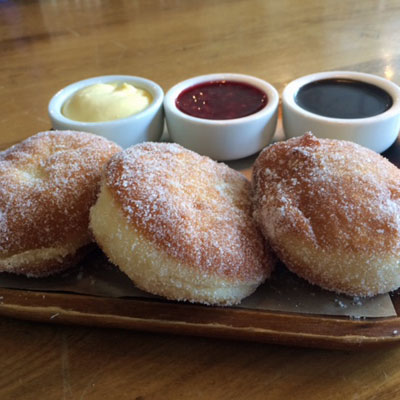
The mezcal was a delicious accompaniment to a complimentary dessert of sugar donuts with three sauces, lemon custard, berry, and chocolate. In Oaxaca, mezcal goes well with pretty much everything.
Lila Downs La Cumbia del Mole (English)
A restaurant like Delarosa fundamentally alters your orientation to the world. McLuhan drew on the myth of Narcissus staring at his own reflection in the water at the bottom of a well just like many of us today stare at ourselves in our devices, our iPhones, our selfies, and the social networks connecting them. In a worst case this can lead to a sense of being Comfortably Numb rather like the song of that name by Pink Floyd. The kind of restaurant I’m writing about makes the perfect antidote, if you open up to it.
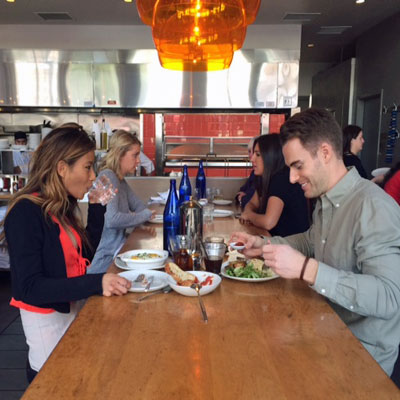
Near the end of his speech, David Wallace explains how worshiping the wrong things according to your unconscious default settings, things like money, beauty, intelligence, etc. will never lead to your happiness. But, you must use your power to choose to see the real life around you.
… the so-called “real world” will not discourage you from operating on your default settings, because the so-called “real world” of men and money and power hums along quite nicely on the fuel of fear and contempt and frustration and craving and the worship of self.
The problem is:
… arrogance, blind certainty, a closed-mindedness that’s like an imprisonment so complete that the prisoner doesn’t even know he’s locked up.
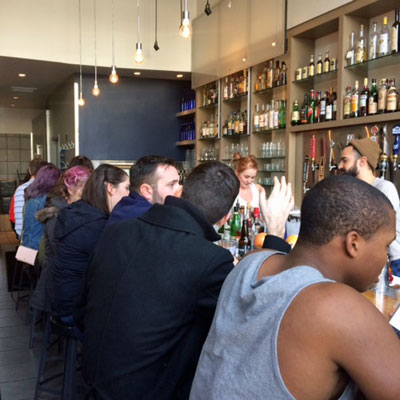
It comes down to the simple choice that Andy gave to Red in this scene from Shawshank Redemption.
It could be that I’ve stretched the medium is the message too far with my speculations on one little restaurant and the way people become special when they congregate inside it. Make of it what you will. But, I’m convinced that it works. It’s taken a long time for me to put this down in words but I’ve sensed it since the beginning.
It’s odd how when you look for something, it suddenly turns up everywhere. And, that’s exactly the point Wallace was making. You will this new way of seeing into being. Even the grandkids know that life is all about your point of view.
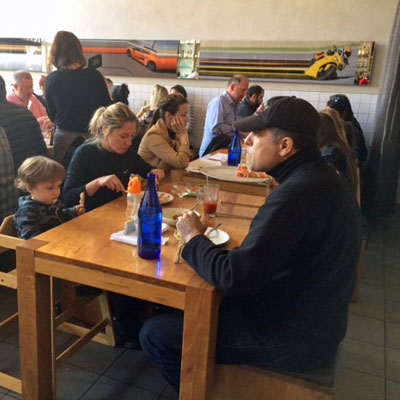
From Elmo in Grouchland
Vanessa Williams, Queen of Trash
I See a Kingdom
Sung by Vanessa L. Williams
Listen up ’cause this is all I have to say
This could be the thing to get you on your way
Just imagine what is old and new again
Maybe then you’ll understand
I tell you
Take a look around and tell me that you don’t see
Just a worthless pile of garbage and debris
I see a kingdom – Shining bright
I can see the colors coming through, yeah
You’ll find the beauty, if you look at something right
It’s all about your point of view
And life is all about your point of view
Everywhere you look a story can be told
And the tales they tell are worth their weight in gold
In a place that’s filled with mountains made of trash
Rotting castaways and broken bits of glass
I dare you
Take a look around and tell me that you don’t see
Just a worthless pile of garbage and debris
Cause I see a kingdom – Shining bright
And if you try then you can see it too, yeah
You’ll see the beauty, if you look at something right
It’s all about your point of view
And life is all about your point of view
I see a kingdom – Shining bright
I can see the colors coming through
You’ll find the beauty, if you look at something right
It’s all about your point of view
And life is all about your point of view
Your point of view
Your point of view

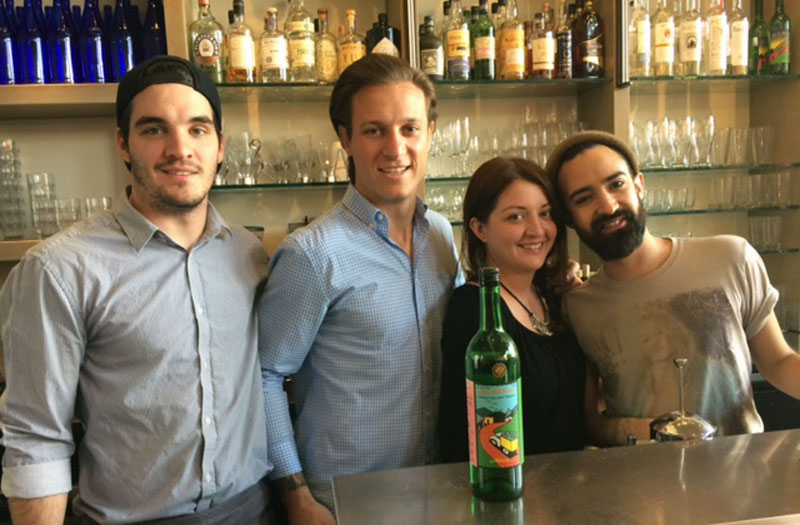
I love this blog….thank you